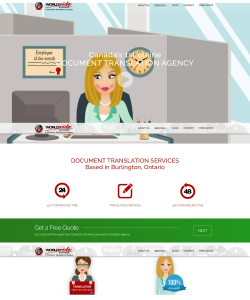In today’s digital age the best and fastest way to see the growth of your business is through online marketing. This means creating an intriguing and engaging website that is easily maneuverable for customers and brings in plenty of online traffic from google searches and the like.
However, for many companies, in order to generate online traffic, website translation is necessary. Without editing and reviewing an automatic translation of website content, companies can face numerous consequences for misleading or offensive content. It’s been reported that some companies experience a decrease in sales, or even legal cases because of inaccurate translation and failed website localization.
This is why finding and using the best website localization and translation services is extremely important. These services can help markets of all different varieties find clients internationally.
What is Website Localization?
Website localization is so much more than just website translation into the local language.
At its core, website localization is the concept of refining a website’s content through language and cultural lenses to provide the best and most relevant information and experience to customers.
Website localization has 5 basic key elements.
- Language and regionalisms – keep your content authentic while still having the user feel like the website was customized for their usage.
- Cultural elements – make even the smallest things align with the cultural nuances of the user. Things like date and time should be in the local format as well as listed holidays and units of measurement.
- Transactional elements – currency, addresses, payment options, basically anything that has to do with the transaction between customer and website should be set to the right locality. This helps avoid errors or issues in processing as well as make the customer feel comfortable purchasing from your website.
- Local communication – addresses, phone numbers, customer support, legal notices or security banners should all be localized. They ensure your customers can engage with every part of your website and make sure your marketing teams have the necessary information to effectively serve your customers.
- Navigation and discovery – make the language selection easy to find and discover so that localization can happen quickly and efficiently for your customers.
These elements are all important to the outcome of the localization of your website, however, there is a bit more to consider when knowing how to go about localizing your website.
How to Localize a Website
Beginning to localize your website starts at the very beginning of the construction process. As you develop your website you should also begin to develop your localization plan. You should know what kind of international scale you are looking for and what countries or locations you hope to reach.
Localizing a website has three key stages: internationalization, translation, and localization.
Step 1: Website Internationalization
Website internationalization is at the very beginning of your website construction. As you develop your website it is imperative to assure that both externally and internally the website is primed and easily adaptable to other markets, languages, and cultures. Make it an international website from the beginning and localization becomes much easier and less costly.
Step 2: Website Translation
Website translation is the second step. While the brunt of the translation work is done after the completed construction of the website, keep in mind while building, that concise webpages are your friend. They decrease the work, time, and possible errors that can occur when trying to translate long and complex sentences. Concise webpages are also important as many foreign languages expand the text due to extra necessary words for grammatical correctness.
Most of the translation can be done by a software translator for low costs. However, it is imperative that you get the translation checked by a human translator or website translation service as well. They will be able to catch errors or cultural and linguistic nuances that the software could not understand.
Step 3: Website Localization
The last step is website localization is the most important part. Notice that website localization is NOT the same as simple website translation. Localization brings it back to the 5 elements above to make your website approachable and familiar to the users in the targeted area. It becomes culturally relatable and relevant to the users which includes changing out pictures, call-to-action icons, videos, and infographics to fit the area.
However, we understand that this can be tricky and seems like a very complex process for those unfamiliar with the necessary nuances. That is why we have brought together the top 5 online website localization services for you into this handy list below.
Best Website Localization Services for Growing Your Business
We used a few different gauges to compare businesses and create this list. Our main question was if there were qualified native speakers on staff. This is imperative because they will be familiar with not only the language, but the culture behind the language and localization process as well. For example, if you are looking to open your market in France, native speakers are best for localization and creating the most online traffic. A French translation website also provides proof of translation certification to ensure the best quality is guaranteed.
Other gauges that we use to compare these companies include the availability of the results of their work, and customer feedback regarding their experience and the product outcome and quality. Since website localization is becoming increasingly in demand in the contemporary world, this list only includes companies that offer this service. While some on this list may also offer other services as well, they all offer website localization services, and in turn translation services.
1. The Word Point
Pros:
- Only human translators
- Quality and price are unmatched in the industry
- Customer’s choice = guaranteed satisfaction
Cons:
- Only human translators means longer times for project completion
The Word Point is our number one choice for a website localization service. They customize their plans and services to the needs of their clients and only have real people with the right qualifications translating and localizing projects. They translate website to French along with 50+ other languages. With their history of productive operation, the Word Point staff are experts in the website translation and localization industry. They can take on projects of varying complexities and varying size.
2. Translate Hub
Pros:
- Employs experts around the world
- Ensures fully localized experience
Cons:
- Slower delivery
If you want a complete localization of your website, TranslateHub is a great option to consider. Because they employ experts from around the world there is always a specialist available with a background to suit your specific needs no matter the target audience or area. Whether that means a website translation to English, to translate a website to French, or any other part of the localization process, TranslateHub can deliver. Even though that delivery is relatively slower compared to other companies that you can find, it remains effective when compared to their products.
3. Genius Translation
Pros:
- Delivers projects quickly
- Acceptable price
- Double approach (2 translators) = high quality
- Offers many languages
Cons:
- No client feedback available
Genius Translation takes an expert approach to their localization and translation services. All of their translations are given to two native speakers for evaluation before being approved for client delivery. This guarantees high quality products for each one of their clients. Translators at Genius Translation deliver their work on time even though their approach to translation and localization has so many quality control checks. The prices are not extremely high for the market, and despite the lack of customer reviews, our experience with this service left us satisfied with the results and earned them a place on the Top 5 list.
4. Aldus
Pros:
- Covers more than 125 countries and regions
- Separate localization managers assigned to projects
Cons:
- High price
- Not as high quality compared to other competitors
For those who are aiming to find a global audience, Aldus is a contender to find on the top of the localization service list. They cover more than 125 countries and regions than span across the world. Each case gets assigned to a separate localization manager within the team meaning they can work directly on how best to reach the intended audience. Their prices are a bit high though for this specialized service, but it could be a worthy investment for some clientele.
5. Worldwide Express
Pros:
- Large staff
- Long history of client satisfaction
Cons:
- Higher prices
In the website localization services industry, Worldwideexpress.ca has decades of experience. They are a great choice for businesses that have a standing reputation and want to work with a company of the same status. Their large staff of language specialists ensure high quality website translations. However, to keep up this large staff and exquisite service, Worldwideexpress.ca does have to charge a bit more than other services.
How to Choose the Best Website Localization Service
There are a few things to note when looking for the best website localization service. Make sure the one you decide on fits your needs and expectations in these factors.
Their process: Website localization is a very technical process, so prospective customers should ensure their agency of choice has done this before. There is a large amount of required interaction between clients and translators.
CMS Integration Knowledge: The company should have CMS (Content Management System) experts to help on the projects. They have gone through courses specifically designed to teach the best localization techniques. This includes cultural appropriateness and economic efficiency throughout the process.
Use of Translation Proxy Servers (TPS): TPS is a well-known software that helps make website localization easy and quicker. It is great when the content stays the exact same throughout translation but won’t work when entirely different configurations is needed to fit the market. Make sure companies are not overusing TPS.
Multilingual SEO: SEO (Search Engine Optimization) is a huge part of gaining online traffic, and the best localization services know this. They will not only translate websites but also help to make sure that consumers find your products and website instead of competitors when searching online.
Is it a full process? The service you choose should offer a full localization process of the entire website and formatting, not just text translation to make sense for the target audience. The full process will better engage with customers and show compassion for their comfort and ease, generating more traffic and helping to put your product as the top choice in the region.
Develop multilingual customer support: The best services will provide consumers with available multilingual customer support. It is your job to hire multilingual staff for on-demand support, but the localization agency can help with things like manuals and FAQ (frequently asked questions) pages.
What is their public user feedback? What are other customers saying about this business? When advertising themselves, companies can say almost anything to try and generate customers, but customers don’t lie and knowing the real experiences they’ve had is invaluable to finding the right one for you. (I might add more generally that reading consumer reviews will help you understand the specific strengths and weaknesses some clients found to decern for yourself if it matters or applies to you. – Consumers don’t lie, but they may give information out of context or have different interests or values as compared to others. For example, one consumer may give a 1/5 rating because the company delivered the document 1 hour past the deadline. But it may have been in order to ensure quality which may have been explained to the customer but the customer failed to mention this in their review.)
Quality control: Does the company do appropriate quality testing involving the target audience prior to going live?
Do they have human translation? Machine translation is great but can only go so far in the localization process. Website conversion is a process with many different facets and needs humans who understand these facets and can work with them all at once. The best localization services will ensure human reviews of the product at every stage in the process.
Best Prices. Make sure the service has a fair price in your budget.
Of course, not all of these things can be checked off by every company. Figure out which are most important to you and find the company that fulfills these interests and more. Website localization is a great process to help expand your business and website’s reach but is only successful when done correctly.





